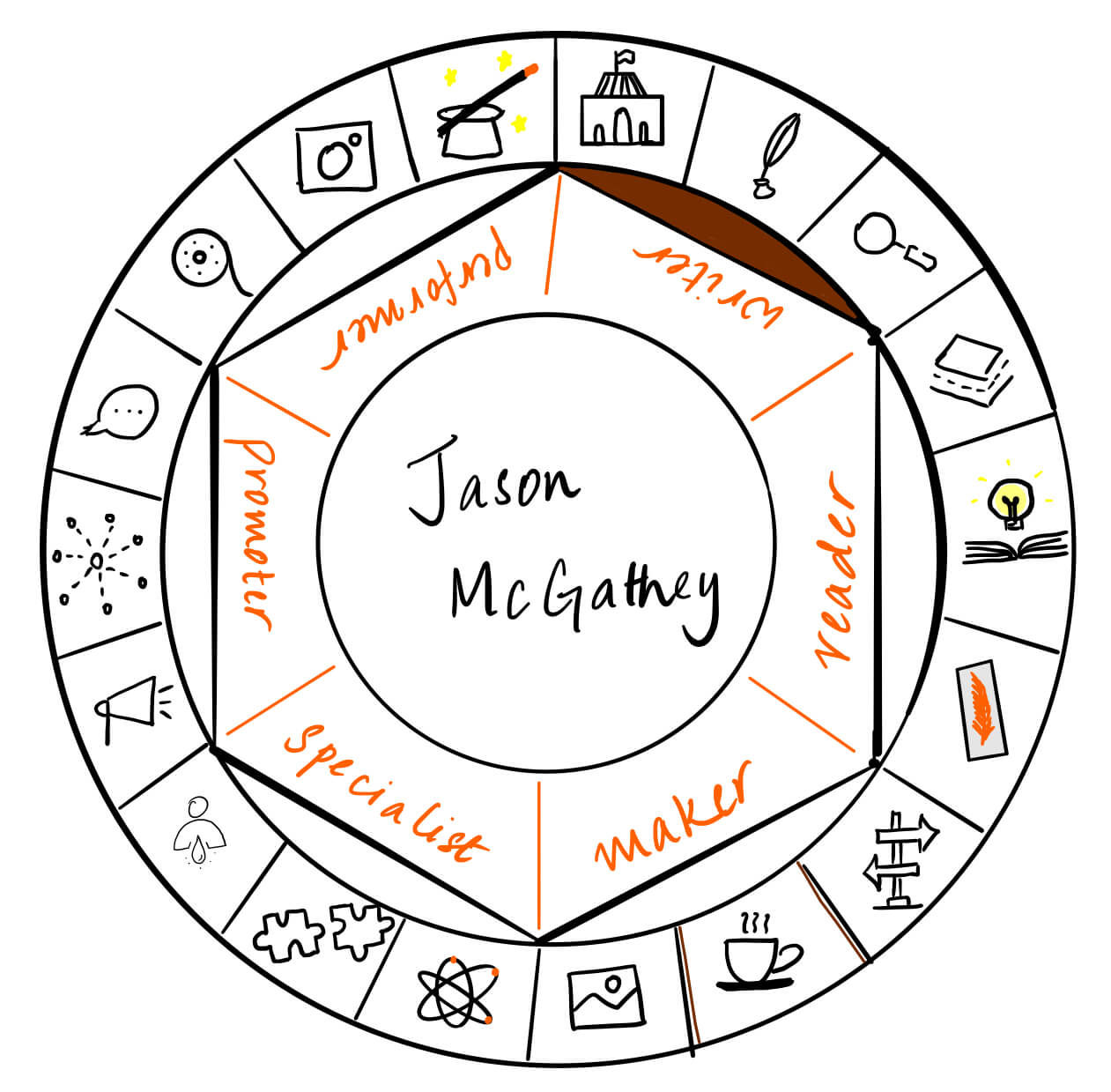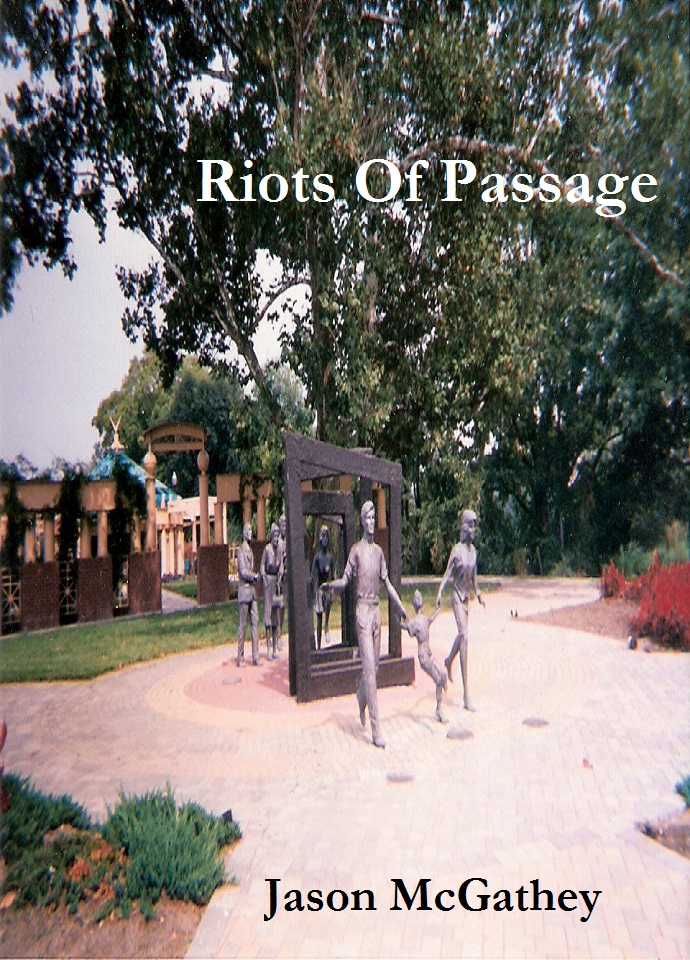
I read a number of biographies and memoirs last year and that got me thinking about the way history and memoirs go together. When author Jason McGathey reached out to me about his book, I thought it was the perfect opportunity to learn more about their similarities and differences. If you have been contemplating this difference or are planning on/ currently working in these genres, I think you will find this post quite enlightening. Jason has published 5 books. His latest, Riots Of Passage, arrived in December 2019. He also maintains a pair of blogs and has contributed to numerous publications, both in print and online. Currently, he is editing his next book and writing the one after that.
Let’s see what he has to tell us about working with history and memoir.
Recently I published my nonfiction book, Riots Of Passage, which I would describe as mostly history with a little splash of memoir, concerning a specific place and time in the not so distant past: Columbus, Ohio, in the late 1990s. However, even in writing the book, I was aware that the so-called memoir elements were not at all the focus of this project. I only included the lives of myself and those around me to present this material in narrative form, and also to provide more personal detail about that era.

So one of the more interesting discoveries along the way was the difference between history and memoir, and how this focus affects your decision making. While it’s true there are a number of similarities – chief among them, I would say, is that you’re going to have to decide on some sort of filter at the outset, a concept to wrap your head around, to avoid becoming overwhelmed by this flood of information – beyond that, the dilemmas presented by each form are slightly different.
To give one minor example of the choices you have to make, continually, throughout a project like this, there’s one episode in Riots where I am taking this girl I’m dating out on a tour of sorts around town. What type of project you are working on will dictate what details survive and which don’t, and inevitably mean that you’re probably cutting out half. Because my intention is to focus on the city itself during this time frame, I describe a car dealership we visit, two shopping malls, a movie theater, and a pet store. Meanwhile, on the chopping block goes most personal information about her. I don’t ever get around to mentioning her kids, for instance, because that isn’t pertinent information to this particular case. Yet you can see where if the focus were reversed, and I wanted to really delve into the personal dramas instead of the city’s history – and a lot of this personal stuff actually was in the original draft – then these outcomes would also have been completely flip-flopped.
Still, I think once you wrap your mind around focusing on a particular filter, this comes fairly easily. Much knottier, though, are what you might call philosophical rabbit holes, where you have to puzzle your way through whether certain types of information should or should not be included, and what the ramifications for these stances are.
In this category is the battle over who gets included and who doesn’t. There are instances where I compiled a ton of information about someone, but then ultimately didn’t wind up using them at all.
For a while this was really bothering me, because the fear is always there that maybe you’re trying to sculpt history around your particular point of view, and leave out everything that doesn’t fit.
But I happened to be reading a book about the Civil War one day and had a breakthrough on my outlook: thinking that, you know, you couldn’t possibly name-check every single soldier who fought in a war. They all had interesting and important contributions, surely, yet it doesn’t mean you’re trying to alter history by omitting them.
So whereas I think it’s kind of understood that with memoirs, a person is basically saying, well, this is the stuff I find interesting, take it or leave it, if you are writing a history of a region or era or event, your viewpoint needs to shift. Instead it’s as though the material is telling you what’s important, and you’re just its editor. Your question then becomes, is this individual or episode crucial to the project? If not, then it gets the heave-ho.
Even finer points can prove thornier, however, and might have to be broken apart on a case-by-case basis at times. Here are some dilemmas which force these kinds of decisions:
- Inflammatory comments said by someone being profiled
- Things you were told that turn out to be untrue
- Opinions shared which you particularly don’t agree with
- Colorful detail which technically doesn’t apply to the topic at hand
With most of these categories, I feel like if writing a memoir, and you care enough to mention the person in question, then you’re probably going to invest all the way and explain at much greater length your personal opinion of that individual or episode. If your focus is more on the historical context, however, then your response is probably a lot more muted. Like for example in Riots Of Passage, I witness a scene where a couple of strangers launch a beer bottle across a parking lot, at the group I happen to be with. Some racial slurs are shouted in response to this unprovoked attack. My reaction is more or less to just capture the altercation and let it hang there as is, rather than attempting to explain or defend either side. I note that there seems to be a lot of violence here and basically leave it at that, because I don’t think this particular context warrants speculating about motivations, and explaining my beliefs surrounding this encounter. Again, if this were a much more personal tale, then I would probably would.

Yet you can definitely lose yourself down a rabbit hole, splitting these quandaries even finer than this. Because analyzing any of this even further will occasionally make you wonder, well, yes, but doesn’t the personality on display here say something historically about this time and place? For example, it’s inevitably going to turn out that you are told a lot of things which let’s just say fact checking later will not exactly clear. Mostly these are just going to be deleted from your files. But what if one person in particular displays a certain knack for spinning mostly tall tales. This might turn into a comment instead along the lines of, Bobby Smith is a talkative, if not exactly to be taken at face value, resident of this neighborhood. If a major figure in your historical record, then you might even begin contrasting what he’s said against what the facts show: Bobby Smith said the Beatles played here in 1965, and he was in the front row; however, as it turns out, they never even performed in this entire state. And then beyond this, if a number of residents display this tendency, you can possibly turn it into some kind of sweeping observation about the era or the region. Whereas I feel like many of the memoirs you read, the whole thrust of the entire book is often, more or less, nutty things the authors were told by their relatives, which were later debunked. And then as a result, the impact this had on their lives, pontificating at great length about these ramifications.
Regarding colorful details, I think it’s generally understood that you want as many of these as possible. But there’s usually more of a juggling act here – which sort of ties in with my earlier point about the girl I was dating – than you might suppose at first glance. To me, you have to kind of balance whether any of this has anything to do with the topic at hand…while at the same time, not just deleting things because they contradict your theories. It all comes down to a question of context. By this I mean we’ve all read histories where the author felt the need to explain what the figure was wearing, listening to on the radio, ate for dinner for every night, watched on TV, and went to elementary school. And then doing this for every individual introduced. Unless you think these details have something to do say about your overarching topic, though, then you safely chuck them. If writing an in-depth examination about Peoria, Illinois, in the early 2000s, then I believe it’s completely irrelevant that one grandma you profiled happened to still watch The Munsters all day, every day. If you came across a half dozen people on the same block who still watched The Munsters religiously, then okay, this might be a topic worthy of further examination, if it said anything about the region as a whole. And finally, yes, if it were your grandma still watching The Munsters around the clock, then you would almost certainly wish to discuss this – in a different kind of project altogether, though.
Let it be said I know nothing about the people of Peoria, Illinois regarding their interest in The Munsters circa early 21st century. These are just some easily relatable examples that popped into my head this instant. Hopefully, however, some of these contrasts presented here help illuminate some differences between history and memoir, and what you might wish to spend some time examining if you are writing either one of these.
I learned so much from this post! Did you find something surprising in this process, whether as a reader or writer?
Ways to connect with Jason:
Websites: Jason McGathey & Love Letters to Columbus

Photo by Andrew Neel on Unsplash

Kriti: Thanks for giving me an opportunity to explain my process to you! That was a lot of fun.